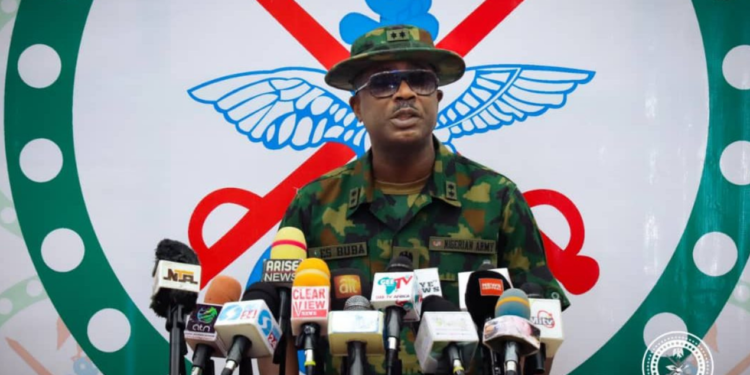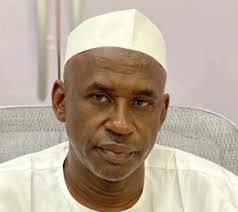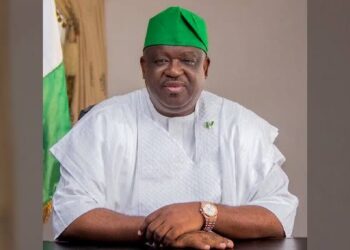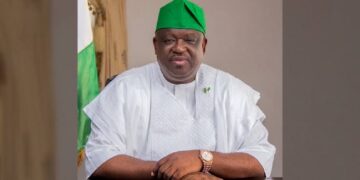The Defence Headquarters (DHQ) has initiated a coordinated effort to counter the rising threat posed by Lukarawa, a newly emerging terrorist group actively recruiting fighters in northern Nigeria. The group, believed to have roots in the unstable regions of the Niger Republic and Mali, has been making in-roads into Sokoto and Kebbi states, taking advantage of the political turmoil following the recent coup in Niger.
Maj. Gen Edward Buba, the Director of Media Operations, disclosed last Thursday that Lukarawa’s recruitment drive has gained momentum, with local communities seemingly aiding the group by sheltering its members. He expressed concerns over the lack of cooperation from residents, who have not reported the group’s presence or activities to the authorities. “The group’s emergence and expansion have been facilitated by the local support they receive,” Maj Gen Buba noted, urging communities to be vigilant and report suspicious activities.
The group recently demonstrated its growing boldness with a deadly attack on Mera town in the Augie Local Government Area of Kebbi State. At least 15 people were killed, and over 100 cows were stolen during the raid, which occurred as residents prepared for Jumaat prayers. This incident marks a significant escalation in Lukarawa’s campaign, showcasing its capacity for violence and the potential threat it poses to regional stability.
In a detailed briefing, Maj. Gen Buba highlighted Lukarawa’s recruitment strategies, revealing that the group is using sermons, social welfare initiatives, and targeted propaganda on social media to attract young recruits.
He emphasized that the group’s digital presence has become a crucial tool in its efforts to expand its ranks, with online messages appealing to economically disadvantaged youths who may see joining as a path to financial stability.
Security experts have raised alarms about the growing influence of Lukarawa in the region. Former Director of the Department of State Services (DSS), Mike Ejiofor, shed light on the group’s history, explaining that Lukarawa is not a new entity but has roots dating back to 2018. According to Ejiofor, the group initially entered Nigeria at the behest of a local conflict leader seeking their support. However, following the death of its leader, Nassala, in the Niger Republic, Lukarawa splintered, with some factions remaining in Sokoto despite attempts by state authorities to negotiate their exit.
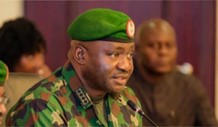
Ejiofor emphasized the need for robust intelligence gathering to monitor the group’s movements and prevent it from gaining further ground. He pointed out that while Lukarawa’s numbers are still relatively small, the group’s persistence and adaptability warrant serious attention. The former DSS chief also highlighted the reluctance of local residents to report the group’s activities due to fear of retaliation, not only from the terrorists but also from potential mistrust of security forces.
Adding to the discussion, Timothy Avele, a security analyst, outlined Lukarawa’s influence in specific areas of Kebbi State. He noted that the group has effectively taken over several functions typically handled by local authorities, including imposing levies, dispensing justice, and even limiting the powers of traditional leaders like emirs. Avele criticized the apparent failure of intelligence agencies, particularly the DSS and police, in pre-emptively identifying and disrupting the group’s activities before they could establish a foothold.
Avele cautioned that the current economic hardships in the country could play into the hands of Lukarawa’s recruiters. “With rising poverty and unemployment, the group’s promises of financial incentives may attract vulnerable youths, increasing its manpower,” he warned. He advised a multi-faceted approach to combating the group, focusing on dismantling its financial networks and leadership both within Nigeria and abroad. He also stressed the importance of leveraging cyber operations to disrupt Lukarawa’s online recruitment campaigns, which have been instrumental in spreading their message and attracting new members.
The Defence Headquarters has acknowledged the urgent need for enhanced coordination between the military, other security agencies, and the state governments to effectively counter Lukarawa’s growing influence. Efforts are being made to intensify intelligence operations and strengthen local community engagement to prevent further recruitment and potential attacks.
As the military gears up its offensive, experts underline the importance of swift, decisive action. They argue that without immediate and effective measures, Lukarawa could become a significant national security threat, exacerbating the already precarious security situation in northern Nigeria. Enhanced intelligence gathering, community cooperation, and targeted strikes against the group’s infrastructure are seen as vital to curbing its expansion and neutralizing its operations before it becomes deeply entrenched in the region.


